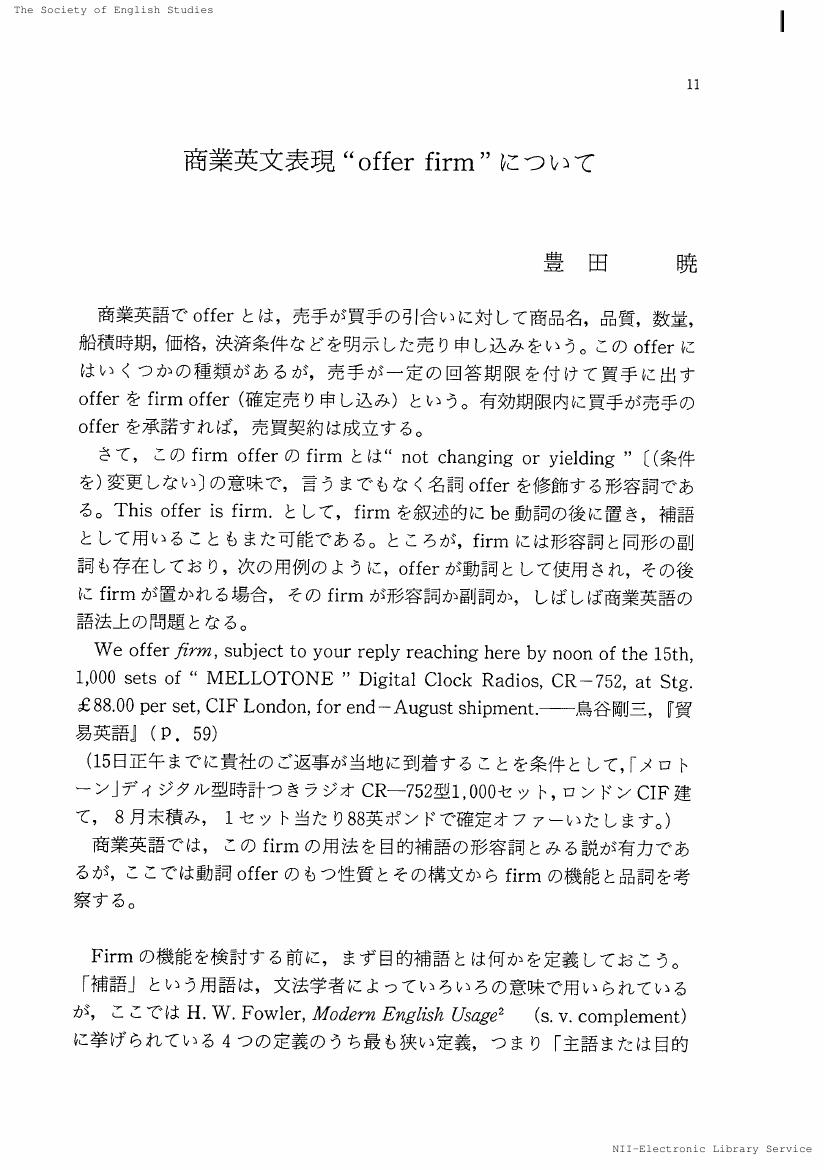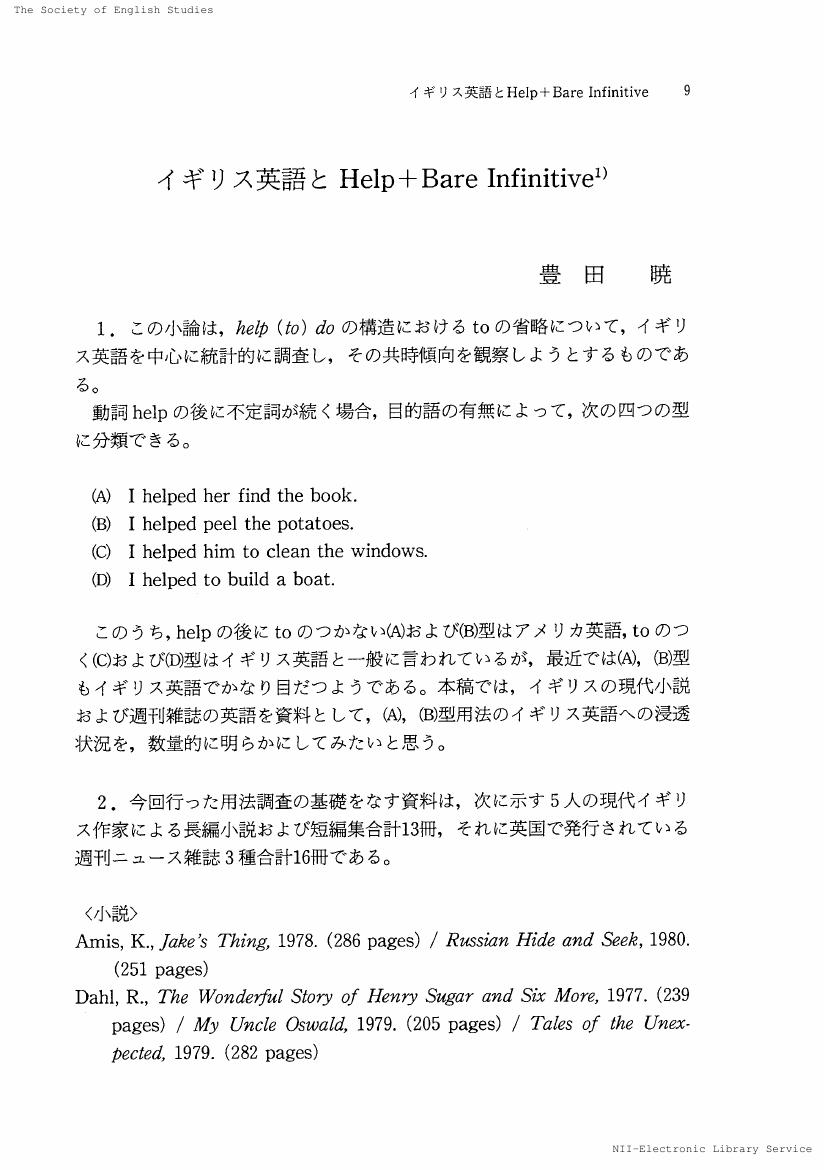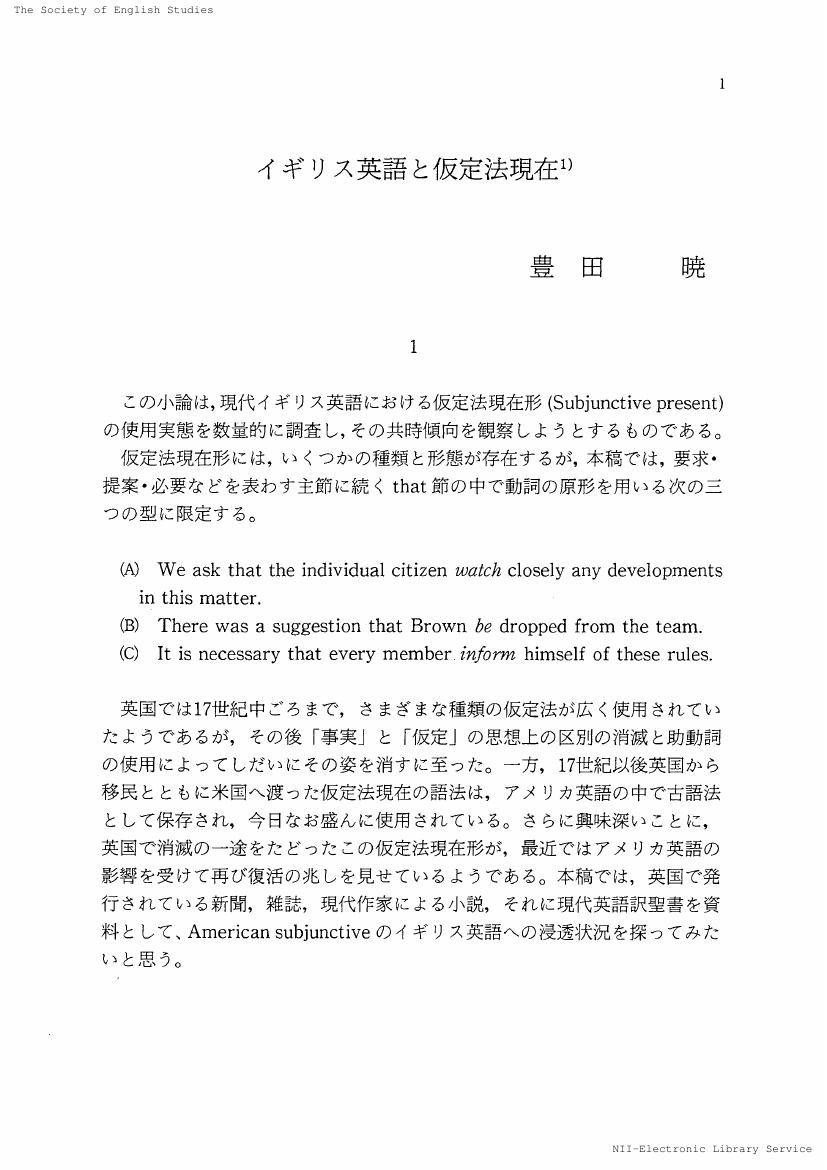1 0 0 0 OA "Gone with the Wind"における主人公の混乱期の生き方について
- 著者
- 横山 芳夫
- 出版者
- 英米文化学会
- 雑誌
- 現代英米文化 (ISSN:24330728)
- 巻号頁・発行日
- vol.16, pp.1-10, 1985-12-30 (Released:2017-09-07)
1 0 0 0 OA 商業英文表現"offer firm"について
- 著者
- 豊田 暁
- 出版者
- 英米文化学会
- 雑誌
- 現代英米文化 (ISSN:24330728)
- 巻号頁・発行日
- vol.16, pp.11-14, 1985-12-30 (Released:2017-09-07)
1 0 0 0 OA 誤りに対する3つのアプローチと今後の課題 : 対照分析,誤答分析,中間言語仮説をめぐって
- 著者
- 石田 雅近
- 出版者
- 英米文化学会
- 雑誌
- 現代英米文化 (ISSN:24330728)
- 巻号頁・発行日
- vol.14, pp.1-8, 1983-11-26 (Released:2017-09-07)
1 0 0 0 OA イギリス英語とHelp+Bare Infinitive
- 著者
- 豊田 暁
- 出版者
- 英米文化学会
- 雑誌
- 現代英米文化 (ISSN:24330728)
- 巻号頁・発行日
- vol.14, pp.9-20, 1983-11-26 (Released:2017-09-07)
1 0 0 0 OA Atavismと犯罪 : McTeagueのDynamism
- 著者
- 高取 清
- 出版者
- 英米文化学会
- 雑誌
- 現代英米文化 (ISSN:24330728)
- 巻号頁・発行日
- vol.14, pp.21-28, 1983-11-26 (Released:2017-09-07)
1 0 0 0 OA 「ハックルベリ・フィンの冒険」の傑作性
- 著者
- 勝浦 吉雄
- 出版者
- 英米文化学会
- 雑誌
- 現代英米文化 (ISSN:24330728)
- 巻号頁・発行日
- vol.14, pp.37-56, 1983-11-26 (Released:2017-09-07)
1 0 0 0 OA ColeridgeとHerbert Read
- 著者
- 高山 信雄
- 出版者
- 英米文化学会
- 雑誌
- 現代英米文化 (ISSN:24330728)
- 巻号頁・発行日
- vol.14, pp.57-77, 1983-11-26 (Released:2017-09-07)
1 0 0 0 OA Is Herzog really a "mensch"?
- 著者
- 小河原 弘士
- 出版者
- 英米文化学会
- 雑誌
- 現代英米文化 (ISSN:24330728)
- 巻号頁・発行日
- vol.14, pp.79-87, 1983-11-26 (Released:2017-09-07)
1 0 0 0 OA 「現代英米研究」会の歩み : 研究発表
- 出版者
- 英米文化学会
- 雑誌
- 現代英米文化 (ISSN:24330728)
- 巻号頁・発行日
- vol.14, pp.89-92, 1983-11-26 (Released:2017-09-07)
1 0 0 0 OA イギリス英語と仮定法現在
- 著者
- 豊田 暁
- 出版者
- 英米文化学会
- 雑誌
- 現代英米文化 (ISSN:24330728)
- 巻号頁・発行日
- vol.15, pp.1-13, 1984-12-30 (Released:2017-09-07)
1 0 0 0 OA ダム建設事業とコロンビア川流域表象史
- 著者
- 馬場 聡
- 出版者
- 英米文化学会
- 雑誌
- 英米文化 (ISSN:09173536)
- 巻号頁・発行日
- vol.52, pp.63-79, 2022-03-31 (Released:2022-04-28)
- 参考文献数
- 18
The coming of electricity to the Pacific Northwest during World War II was expected to provide new possibilities not only for economic growth but also for social transformation. This paper explores the various aspects of cultural representations of the development of the Columbia River basin, which extends between the states of Oregon and Washington. In the first part of this study, attention is paid to the narrative techniques used in two government-funded promotional films about dam construction produced by Bonneville Power Administration (BPA). After examining the rhetorical strategies that were employed in the BPA films to propagate the necessity of river development, our analysis turns to several songs sung and composed by Woody Guthrie, that were included in one of the films. Our discussion foregrounds this curious combination: a politically radical folk singer from the Midwest and a federal power agency rooted in the Northwest. Finally, we analyze several literary works that critically depict the Columbia River development and its aftermath. A careful comparative review of those works reveals the political unconsciousness of the region in the decades after the New Deal.
1 0 0 0 OA 『二都物語』にみる情報伝達速度―18世紀と19世紀の技術格差から
- 著者
- 原田 昂
- 出版者
- 英米文化学会
- 雑誌
- 英米文化 (ISSN:09173536)
- 巻号頁・発行日
- vol.52, pp.23-37, 2022-03-31 (Released:2022-04-28)
- 参考文献数
- 12
Recent studies have indicated that A Tale of Two Cities depicts the French Revolution as a critical period in which information technologies had developed and information transmission had accelerated and that it thereby represents the idea that social changes and technological development are inseparable. Those studies, however, have paid little attention to the end of Book 2 and the beginning of Book 3 of the work. These chapters clearly illustrate the impact of the means of communication on people’s lives, making them the most significant part of this work of fiction in regard to its consciousness of communication. This paper verifies that the aforementioned chapters are crucial for comprehending the understanding of the media presented in this work. This study first focuses on the dates of events in which those chapters progress. The time they span is sufficient to deliver messages from Paris to London by telegraph but is not long enough to do so without electric wires. It then reaffirms the meaning of the dates by examining the fact that Charles Dickens had set this scene in winter before changing his manuscript. Finally, it analyses Darnay’s travel across the English Channel, which is repeatedly impeded, to clarify that this novel delineates the substantial gap of communication between the eighteenth and nineteenth centuries.
- 著者
- 松本 昇
- 出版者
- 英米文化学会
- 雑誌
- 英米文化 (ISSN:09173536)
- 巻号頁・発行日
- vol.37, pp.159-163, 2007
- 著者
- 山内 圭
- 出版者
- 英米文化学会
- 雑誌
- 英米文化 (ISSN:09173536)
- 巻号頁・発行日
- vol.28, pp.105-118, 1998
First, the investigation was made into Steinbeck's descriptions of men and women. Originally his men work outdoors, and women at home. But, during this novel, men lose their lands, tools and jobs, and the original androcentric system no longer works. On the contrary, women's business such as cooking, washing and home-protecting invariably must continue. Thus women can keep their status. Then examinations of the human life cycle have been done. That is, birth, aging and death. Steinbeck thought the living have higher priority than both the dying and those who will be born. When aging is described realistically, it is sometimes considered as ugly. He makes candid descriptions of aging. He also describes the aged as respectable figures, respected in a very American way as ancestors and pioneers. A man dies after a life cycle. But men, as a whole, continue to live. In the Life Cycle as a whole, deaths, alternations of generations, mishaps and accidents are surely step-backs. But a death is not a 'full step-back,' but 'only half a step-back,' if it brings something helpful to the living, or if the person who is dying leaves something. This kind of idea is one of the underlying philosophies of the novel. Steinbeck built a frame of nature by putting the description of natural forces both at the beginning and at the end of the novel. In the frame, he describes men living despite of some step-backs, and praises them for their resilient attitudes.
- 著者
- 須藤 祐二
- 出版者
- 英米文化学会
- 雑誌
- 英米文化 (ISSN:09173536)
- 巻号頁・発行日
- vol.50, pp.87-103, 2020
<p>In Washington Irving's <i>Bracebridge Hall</i>,<i> or The Humorists</i>,<i> A Medley</i> (1822), Frank Bracebridge, a fictional squire, tries to protect his and his family's old-fashioned lifestyle from the overwhelming wave of the industrial revolution. With the voice of Geoffrey Crayon, Irving ironizes their bigoted adherence to the disappearing customs of England's "good old times." William Hazlitt criticized this work as literary anachronism, blaming Irving for not seeing what the British were really like and building up his idealized image of them based on the old books he had read in America. Behind this anachronism, however, exists Irving's critical vision on the parental-filial relationship between the United Kingdom and America, and the inheritance of the (trans) national past. "Dolph Heyliger," a success story of a young American, placed near the end of <i>Bracebridge Hall</i>, evinces that Dolph's relationship with his ancestral past is quite the opposite of what the English squire does for restoring the good old times in his fief. Dolph is neither a seeker for nor a guardian of what was gone. His ancestral ghost guides him to an itinerary in which he discovers his ancestral treasure in the end. Not only is this story a huge irony to Bracebridge's unsuccessful restorationism, but also it works as Irving's metaphorical vision on how America, a grown-up child that severed itself from the United Kingdom, can reinstall a new parental-filial relationship with this country. This transatlantic vision includes the American author's aspiration for the role of America as the potential inheritor of British's literary and cultural tradition. <i>Bracebridge Hall</i> opens a space to situate such a vision, without which Irving would not end his literary pilgrimage in the United Kingdom that he began with <i>The Sketch Book</i>.</p>
- 著者
- 河内 裕二
- 出版者
- 英米文化学会
- 雑誌
- 英米文化 (ISSN:09173536)
- 巻号頁・発行日
- vol.49, pp.79-85, 2019
- 著者
- 曽村 充利
- 出版者
- 英米文化学会
- 雑誌
- 英米文化 (ISSN:09173536)
- 巻号頁・発行日
- vol.26, pp.27-39, 1996
Charles Cotton was a close friend of Izaak Walton and wrote the second part of The Compleat Angler. It is not surprising that Walton and Cotton shared the common political belief and religious faith, royalist and Anglican. In this paper, it will be suggested that Cotton quite possibly was connected with the Great Tew Circle, an Anglican latitudinarian group, some of the chief members of which were Walton's close friends. Friendship between Walton and Cotton seems to have been long and strong, and the evidence of it is found in Cotton's verse, their epistles, and the second part of The Compleat Angler. Cotton was quite explicit about his zealous royalist opinions in his verses, and celebrated the King's return and the Restoration. Three members of the Great Tew Circle can be mentioned in relation to the life of Cotton. Clarendon, a member and the most influential politician of the Restoration England, was a friend of Cotton's father. Cotton also wrote that he had 'been favoured' by another member of the circle, Sheldon, who was a post-Restoration Archbishop of Canterbury. Lastly, in one of his poems, Cotton severely criticized Edmund Waller, an ex-member of the circle, for writing a panegyric on Oliver Cromwell.
- 著者
- 横山 千枝子
- 出版者
- 英米文化学会
- 雑誌
- 英米文化 (ISSN:09173536)
- 巻号頁・発行日
- vol.25, pp.47-56, 1995
Murdoch thinks that love is to recognize others and to regard them as independent from and equal to oneself as well as to respect them. Moreover, she thinks that love can be acquired by being attentive to God. She says that both God and Good are the concordant point of everything which is located far from ourselves. In Unicorn, Hannah, who lives in Gaze Castle and is the heroine of this novel, finds comfort in agony. She is captured by the illusion that others and even she herself regards her as God, until she dies. Max, who is a scholar studying Plato, knows Good through books but cannot enter the situation of Good. He, who becomes Hannah's heir after her death, is captured by age and books. Through their attitudes to God and Good, Murdoch develops her idea about God and Good in her work. First, I will examine how the idea of Murdoch about God and Good is treated and then examine Murdoch's idea that God is identified with Good.
1 0 0 0 OA 猥褻出版物禁止法(1857)の誕生と抵抗勢力
- 著者
- 佐藤 治夫
- 出版者
- 英米文化学会
- 雑誌
- 英米文化 (ISSN:09173536)
- 巻号頁・発行日
- vol.38, pp.5-30, 2008-03-31 (Released:2017-06-20)
The present paper reevaluated the significance of the Obscene Publications Act 1857(OPA), or Campbell's Law(An Act for more effectually preventing the Sale of Obscene Books, Pictures, Prints, and other Articles) from the view point of assessing the opposing forces in and out of the British Parliament that influenced the actual law-making process. In good contrast with the first hesitant approach before his submission of OPA, Lord Campbell, the propagator of OPA, is found quite straightforward in pressing his objective, widely supported by the public opinions outside the Houses, to his fellow members of the House, which might have unnecessarily provoked repulsive attitudes from some of them-probably best represented by Lord Lyndhurst, who openly made objections in the House of Lords, referring to the possibility of endangering the British literary works in the process of enforcing OPA. The verbal conflict between the two parties will well be summarised as that of maintaining the standard of decency in society as against the protection of national literature. It is quite noteworthy that the process of law-making itself only promoted the discussion of decency and moral integration, and not the protection of literature.
- 著者
- 吉原 令子
- 出版者
- 英米文化学会
- 雑誌
- 英米文化 (ISSN:09173536)
- 巻号頁・発行日
- vol.30, pp.79-99, 2000-03-31 (Released:2017-06-20)
In writing about her childhood along the Texas-Mexico border, Gloria Anzaldua describes the experience of being caught between two cultures, as being an alien in both. The actual physical borderland that Anzaldua describes in Borderlands/La Frontera: The New Mestiza is the Texas-U.S. Southwest/Mexican border, but the "borderlands" she refers to are something more psychological, sexual, and spiritual. These Borderlands are present wherever two or more cultures confront each other, where people of different races occupy the same territory, where all socio-economic classes touch, and where the confusion of sexual and gender identity exists. Her preoccupations with the inner life of the Self, and with the struggle of that Self in the borderlands provide the unique positioning consciousness. The quest for one's identity based on race, gender, sexuality, class, nation, etc., ends up in the system of binary oppositions. In my view, in this book Anzaldua criticizes an absolute despot duality that says we are able to be only one or the other and insists that the Self is plural, transformative, and performative. She searches for a way of balancing, and mitigating the system of binary oppositions through knowing and learning the history of oppression. Anzaldua suggests that we should accept our differences and that our differences should open political lines of affiliation with other groups to challenge the specific forms of domination that we share in common.









